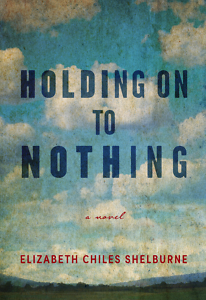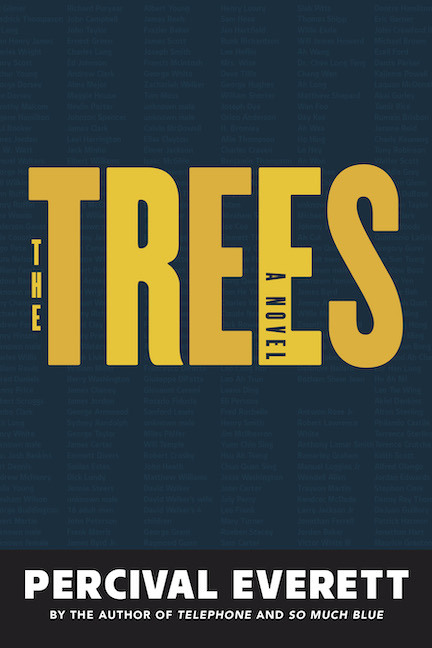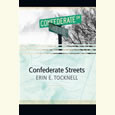All The Mistakes Families Make
Small-town lovers grapple with an unexpected pregnancy in Elizabeth Chiles Shelburne’s Holding on to Nothing
FROM THE CHAPTER 16 ARCHIVE: This review originally appeared on October 10, 2019. The post has been updated with new publication details.
***
Elizabeth Chiles Shelburne’s debut novel, Holding on to Nothing, appears to be made from the most familiar ingredients of Appalachian fiction — bluegrass pickers, barroom eccentrics, Walmart checkers, tobacco farmers, and a generous amount of drinking. But out of these elements Shelburne has created a fresh, moving story of young lovers in a mountain town and the myriad obstacles that confront them as they stumble into their adult lives.

Lucy Kilgore and Jeptha Taylor are products of a small East Tennessee town — the kind of place where escaping to the Big City doesn’t mean to New York or L.A. It means escaping to Knoxville — whether to work and study toward a brighter future, as Lucy had always planned to do (and the whole town expects her to do), or else to seek the termination of an unexpected pregnancy. Several characters hint that Lucy ought to do just that after the briefest of drunken trysts with the town’s most maligned ne’er-do-well, Jeptha Taylor, implodes her bright city dreams.
Having lost her own parents to a car crash during childhood, Lucy doesn’t respond to the stunning news of her pregnancy the way she might have expected. Overwhelmed by all the difficulty that her new situation implies, Lucy nevertheless feels that “there, muddled in the fear and horror of carrying the town drunk’s kid, was a flicker of delight. This baby would be her family. Nothing pieced together, nothing cobbled.”
Though she still lives with LouEllen, the family friend who stepped in to care for her after her parents’ deaths, Lucy is determined to raise her baby by herself. She has no intention of letting strong-willed, opinionated LouEllen take over. Lucy’s deepest desire is to overcome the loneliness that has defined her identity since the accident. This baby is her chance to start “her own family, one that made all the mistakes families make when they are exhausted, broke, or unsure.”
Jeptha suffers from the opposite problem: He can’t seem to get away from his family. For generations, the Taylors have featured prominently in all the worst drunken scrapes and scandals in town, and Jeptha seems hellbent on adding to the infamy. Though he sometimes longs for more, Jeptha believes everyone around him, including his own siblings, when they claim he is just another worthless Taylor.
 Secretly in love with Lucy Kilgore since he was 16, Jeptha can barely believe the near-miraculous prospect of being with her, much less fathering her baby. Everyone in town, including Jeptha, wonders whether he can overcome their entrenched idea of what kind of man he is. Can he get serious about his family’s tobacco farm or his mandolin playing? Can he quit drinking?
Secretly in love with Lucy Kilgore since he was 16, Jeptha can barely believe the near-miraculous prospect of being with her, much less fathering her baby. Everyone in town, including Jeptha, wonders whether he can overcome their entrenched idea of what kind of man he is. Can he get serious about his family’s tobacco farm or his mandolin playing? Can he quit drinking?
Shelburne fills her novel with a memorable supporting cast. LouEllen provides a willful foil for Lucy’s sense of familial alienation. The town’s tough, pragmatic bar owner, Judy, hails from faraway Boston and has little patience for blinkered provincial nonsense. Jeptha’s sister, Deanna, is a classic small town mean girl, so vicious that when she discards Lucy after a brief friendship, Lucy feels “like a fish on catch-and-release day, bloody but gratefully alive.” This chorus of characters rushes in to exert their influence on Lucy and Jeptha’s fate as a couple and as fledgling parents.
Shelburne, an East Tennessee native, brings a sweetness to her story that somehow manages never to turn saccharine, a whimsy that never becomes twee. Just when certain moments — like a hook-up with a lifelong crush or a well-intended marriage proposal — seem to be heading toward schmaltz, Shelburne diffuses the sentiment with humor or unexpected turns. Even as the novel’s second half grows darker, that nuanced warmth remains. What emerges is a hopeful yet wry novel driven by loveable, fallible characters.
Holding on to Nothing shines a light on the troublemaking forces that beset us when we attempt to improvise our futures, deciding who we will embrace as family. Whether we’re longing to find the family we’ve never had or scrambling to get out from under the oppressive shadow of the one we’ve already got, this story reveals the perils and small graces of that struggle.

Emily Choate holds an M.F.A. from Sarah Lawrence College and is the fiction editor of Peauxdunque Review. Her fiction and nonfiction have appeared in Shenandoah, The Florida Review, Tupelo Quarterly, Yemassee, Late Night Library, and elsewhere. She lives near Nashville, where she’s working on a novel.


